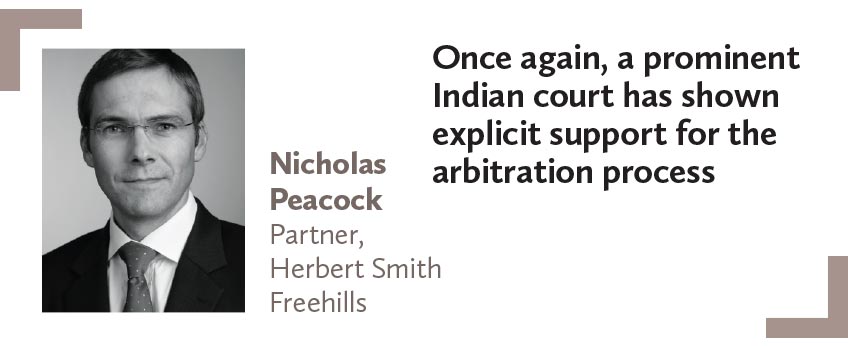The battle between Vodafone and the government serves as a pressure gauge for the courts in investment treaty disputes. Rebecca Abraham reports on recent developments
The collapse of the Dabhol power project in 2001 resulted in the government settling nine disputes related to bilateral investment treaties (BITs). Then came a claim by an Australian company, White Industries, which resulted in a 2011 arbitral award of US$4million against India for breaching its treaty obligation to provide “effective means of enforcing claims and enforcing rights”.
The award was the first instance of India being found in breach of its BIT obligations and set the ball rolling for foreign investors who sought compensation for roadblocks they faced in India. The country is being sued by around 15 companies, and their BIT-related claims are under arbitration.
The most recent is a US$776 million claim by Nissan against India alleging a breach of the 2011 India-Japan Economic Partnership Agreement. The Japanese car maker alleges non-payment of incentives promised by the Tamil Nadu government under a 2008 agreement for building a car plant in the state. An injunction is being sought in India against the arbitration.
SHOT IN THE ARM
These claimants and others who are mulling going down the BIT arbitration route were likely emboldened by a 7 May ruling in Union of India v Vodafone Group Plc United Kingdom and Anr in which Delhi High Court refused an injunction sought by the Indian government against an arbitration initiated by Vodafone under the India-UK bilateral investment promotion and protection agreement.
Vodafone had earlier initiated arbitral proceedings on the same issue under the India-Netherlands BIT. But the Indian government cried foul when the India-UK BIT arbitration was initiated, and accused the company of abusing the process. The court observed that Vodafone had offered to consolidate the proceedings under the Netherlands treaty with the arbitration under the India-UK BIT, thus avoiding the possibility of relief being granted twice, as well as conflicting awards.
The ruling by Justice Manmohan said it cannot be presumed that “filing of multiple claims by entities in the same vertical corporate chain with regard to the same measure is per se vexatious”.
International lawyers watching from the sidelines have applauded this decision.

The firm has been advising Vedanta Resources on its US$3 billion claim against India under the India-UK BIT arising from the imposition of a retrospective tax. Arbitration of this dispute was initiated in 2015 and final hearings are scheduled for August.
Viren Mascarenhas, a New York-based partner at King & Spalding who has represented energy and mining companies in investment treaty arbitration claims against several countries, says investors “should take comfort in this decision”.
“The judgment is a step forward in developing India’s image as an increasingly pro-arbitration and investor-friendly jurisdiction,” adds Sherina Petit, head of the India practice at Norton Rose Fulbright.
Lawyers in India have echoed similar sentiments. “It recognizes investment treaty arbitration as a legitimate and accepted adjudicatory mechanism for investors’ grievances under international law,” says Atul Sharma, managing partner of Link Legal India Law Services.
Ganesh Chandru, an executive partner at Lakshmikumaran & Sridharan, who heads the firm’s international arbitration practice, sees the ruling as “a welcome step for foreign investors as it boosts their confidence in Indian courts vis-à-vis treaty disputes”.
BLOWING HOT AND COLD
Be that as it may, India has long had an ambivalent relationship with foreign investors. Since starting in 1994, India has entered into 84 BITs, but not all have been enforced.
Following the White Industries award, the government sought to water down some of the investor protections provided in the BITs, which had been expansive until then. White Industries had made its claim against India by using a most-favoured-nation clause in the India-Australia BIT.
You must be a
subscribersubscribersubscribersubscriber
to read this content, please
subscribesubscribesubscribesubscribe
today.
For group subscribers, please click here to access.
Interested in group subscription? Please contact us.



























